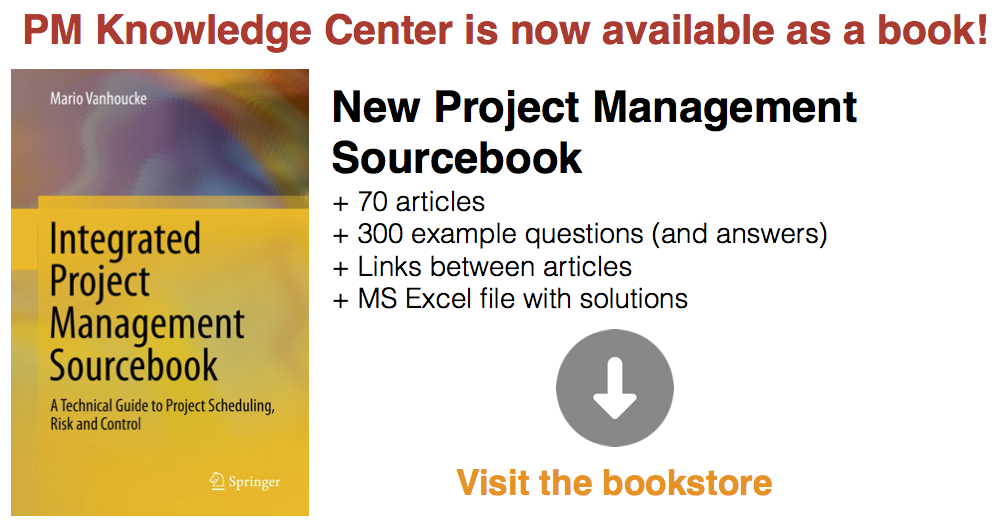The Critical Path Method (CPM): Incorporating activity time/cost trade-offs in a project schedule
The Critical Path Method (CPM) is a project scheduling technique to analyze and represent the tasks involved in completing a given project. It incorporates a trade-off between an activity’s duration and cost and relies on concepts similar to the program evaluation and review technique (PERT, see “The Program Evaluation and Review Technique (PERT): Incorporating activity time variability in a project schedule”).
In this article, three CPM related topics will be discussed:
- Time/cost trade-offs in activities
- Scheduling objectives of CPM
- The Project Scheduling Game (PSG)
Time/cost trade-offs
The critical path method assumes that the duration of an activity depends on the amount of resources assigned to it, and incorporates a trade-off between its duration and the cost of the assigned resources. More precisely, the more resources have been assigned to the activity, leading to an overall increase in the cost, the lower the expected duration of the activity.

Figure 1: Time/cost trade-offs for a project activity
This time/cost trade-off is given in figure 1. The CPM assumes four pieces of information for each project activity, as follows:
- Normal duration: The maximum duration of the activity.
- Crash duration: The minimum duration of the activity.
- Normal cost: The cost associated with the normal duration.
- Crash cost: The cost associated with the crash duration.
The normal duration is equal to the minimal expected duration when the activity is performed with the lowest possible amount of resources, leading to the lowest total activity cost (normal cost). The crash duration is the shortest activity duration, when the maximum amount of resources has been assigned to the activity, leading to the highest activity cost (crash cost). Each dot in figure 1 represents a so-called activity mode to represent the list of time/cost combinations for this activity.
The aim of the critical path method is to schedule the project under a pre-defined scheduling objective, i.e. the choice of an activity mode for each activity to optimize a scheduling objective. A decrease in an activity‘s duration and the corresponding increase in the activity cost is known as activity crashing.
Scheduling objectives
Scheduling a project requires a scheduling objective in order to optimize the project schedule according to the wishes and needs of the project manager (see “Resource constrained project scheduling: What is my scheduling objective?”). The CPM has a dual view on the project schedule, i.e. a time or cost point-of-view, resulting in two possible scheduling objectives. Figure 2 illustrates the time/cost profile on the project level as a result of selected time/cost combinations (i.e. modes) for each project activity. The two scheduling objectives are given along the following lines:
Deadline objective: The objective is to determine the activity durations and to schedule the activities in order to minimize the project duration, given a predefined total budget restriction.
Budget objective: The objective is to determine the activity durations and to schedule the activities in order to minimize the project costs, given a predefined project deadline restriction.

Figure 2: The scheduling objective of the CPM: time or cost
Project Scheduling Game (PSG)
The Project Scheduling Game (PSG) is an IT-supported simulation game that illustrates the characteristics of scheduling a real-life project with discrete time/cost trade-offs in the project activities as described in this article. The project is based on a sequence of activities for a large real-life project at a Belgian company. The participant (manager) of the game has to construct a dynamic project schedule for the discrete time/cost trade-off critical path method. By allocating nonrenewable resources (i.e. money) to a particular activity, the manager decides about the duration and corresponding cost of each network activity. The manager schedules the project with the negotiated project deadline in mind, focusing on the minimization of the total project cost. For more information, see “The Project Scheduling Game (PSG): Time/cost trade-offs in practice”.
© OR-AS. PM Knowledge Center is made by OR-AS bvba | Contact us at info@or-as.be | Visit us at www.or-as.be | Follow us at @ORASTalks


